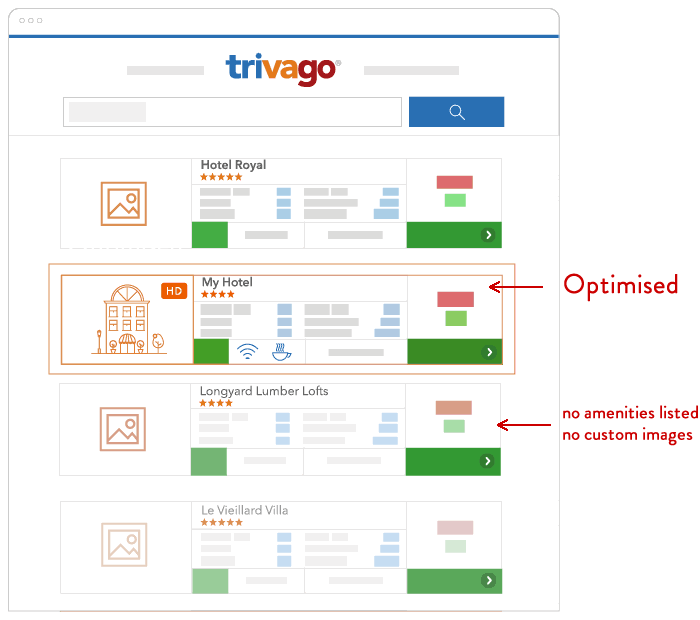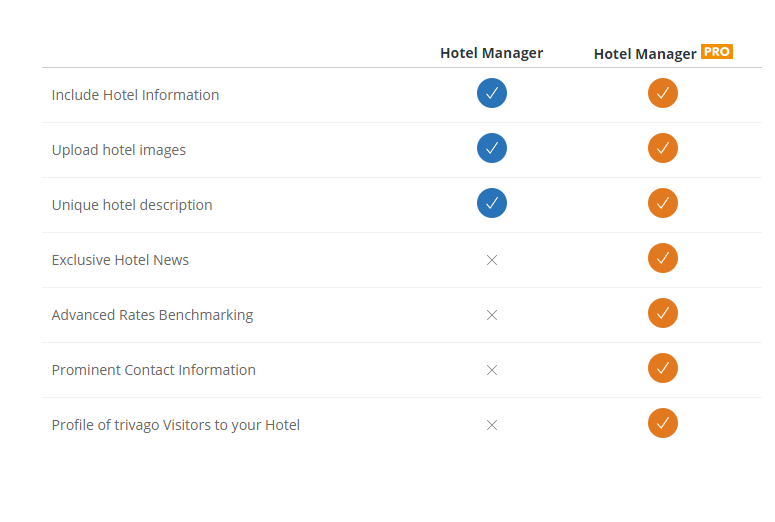In a recent interview with Skift, Johannes Thomas, managing director in charge of hotels at Trivago, talks about Trivago’s energetic push to strengthen ties with hotels. Trivago, a major Meta search site, aims to reduce the company’s reliance on advertising from OTAs, their traditional focus.
To underline how significant the Meta search market is, Trivago’s traffic grew by 59% in 2015, and nearly 1 in 2 travellers (47%) use hotel Meta search sites to compare prices, according to ResearchNow.
When you visit Trivago, the links for bookings are usually overwhelmingly oriented towards OTAs. However, they’re now looking to ways to make listings from hotels’ actual websites more prominent, including adding the links back to hotel sites for direct bookings.
In addition to tilting their focus towards hotels, Thomas emphasized to Skift that this new focus would be specifically on independent hotels. They have previously been focused on chain hotels and OTAs, and these will continue to remain a priority. However, Thomas says they now believe that strengthening relations with independent hotels is the way forward.
They are also working on developing what Thomas calls a ‘hotel-friendly’ version of facilitated bookings. By facilitated bookings, Thomas is referring to the trend Meta search sites are initiating to take hotel bookings on their own websites in a way similar to OTAs. This new trend for Trivago echoes recent similar innovations from Google, Tripadvisor, Booking.com and Expedia.
That’s still in the pipeline, although Trivago is getting closer to premiering their facilitated bookings. Just this past week, however, Trivago has launched its Hotel Manager Pro. This is a major step for the company in expanding their focus.
Trivago Hotel Manager Pro: A Change in Approach
As a strong first step towards making this shift towards independent hotels a reality, Trivago has revitalized their Hotel Manager, launched in 2014. They’re debuting a new ‘Pro’ version that will give hoteliers more access and space to optimize their hotels’ profiles on the site. Trivago is trying to create “a good bridge” between Meta search and direct bookings for hotels, according to Thomas.
There is a clear advantage to hotels in being connected to Trivago through their own website booking engine. If a hotel is not actively engaged with Trivago, all bookings coming from the Meta search site will be funneled through OTAs, leading to hotels paying higher commissions than they would if they were garnering direct bookings from Trivago.
Thomas reinforces this point in his interview, noting that it “can be powerful to really take [Trivago] as a marketing channel and optimize the channel [through CPC advertising]. Also, I think the potential might be higher to really direct the traffic to their own website, generating a direct booking for the hotel.”
The new Hotel Manager Pro lets hotels do more to solidify this advantage. According to Thomas, “Registered, top-ranked hotels receive 35% of their bookings through Trivago. This illustrates the significance of our platform to hotel owners and marketers and delivers tangible results to hoteliers’ businesses.” These hotels are ones that have optimised their profile on Trivago.
The new Pro feature will allow hotels the opportunity to build a stronger profile with the following features:
- More prominent contact details for hotels: details will be highlighted in blue, including the direct link to their site.
- Hotel news brief just below contact details – this provides who you are, how to get in touch and any news you have (a new restaurant or a redecorating, for example) all in one.
- Comprehensive benchmarking: choose the hotels you’d like to be benchmarked against, and get excellent visuals and graphs showing current performance and 6 week projections. This information can be used for price planning, marketing strategy and communications.
- Detailed visitors’ profile: the top 10 nationalities, whether they travel for business or pleasure, and average booking lengths. Hotels can leverage this to strengthen targeting.
You can check it out on their site here, and here’s a quick comparison of their free, automatic version versus the Pro tool.
Conclusion
Trivago is going forward in a way that will emphasize independent hotels in a way it has not done in the past. They’re focusing on the importance of content, and have recognized that reaching out to hotels themselves is the most crucial source of that content.
Hotels have the images, the content and the insider knowledge of their own brand to present themselves in the best light. Trivago is arguing that building a strong profile on their site is a “win-win for hotels,” with hotels getting ranked higher as they build better profiles and garner more traffic while Trivago builds a better search experience for its users.
How has your hotel used Trivago? What are your thoughts on their latest feature?





